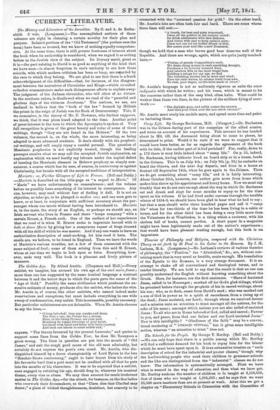The Golden Age. By Alfred Austin. (Chapman and Hall.)—Every satirist,
we imagine, has accused his own age of the auri sacra fames; more than one has suggested by the same ironical language a contrast between it and the better days to which the poets gave the name of the "Age of Gold." Possibly the same civilization which produces the ex- cessive estimate of money, produces also the satirist, who lashes the vice. Mr. Austin is, of course, like other satirists, who cannot indeed make reservations and exceptions, bat must include everything in one wide sweep of condemnation, very unfair. This is excusable, possibly necessary. But particular unfairnesses are not defensible. When Mr. Austin chooses to say the lines,— " '0 long befooledl they say, awake and deem The Past a tale, the Future but a dream.
Here, in the living Present, act your part., • Straining its vulgar blessings to your heart. Let hand with hand and brain with brain contend, And each one labour to some selfish end,'" express, "The theory favoured by the present Laureate," and quotes in support some lines from the Golden Year, he does Mr. Tennyson a great wrong. The lines in question are put into the mouth of "Old James," and suit the rough good sense of the old man admirably, but certainly do not express the poet's own creed. Mr. Austin, who dis- tinguished himself by a fierce championship of Lord Byron in the late "Beecher-Stowe controversy," ought to have learnt from his study of his favourite bard that a poet must not be credited with all that he puts into the mouths of his characters. It was to be expected that a satirist, once engaged in rebuking his age, should drag in, whatever his nominal theme, every vice or abuse. We may thus account for much irrelevant matter in The Golden Age,—for the attack, for instance, on the fine ladies who overwork their dressmakers, so that "Clara dies that Claribel may dance ;" a piece of wicked thoughtlessness, doubtless, but scarcely to be connected with the "accursed passion for gold." On the other hand, Mr. Austin's hits are often both fair and hard. There are some whom these lines will suit:— "A fourth, for beer and piety renowned,
Owns all the publics in the country round: Its drink adulterates with face demure, And burns with zeal to keep opinion pure; Cares not one jot for bodies drunk or sick, But scares your soul like a new Dominick,
though we hold that a man who brews good beer deserves well of the Republic. And there are wrongs, again, which are quite justly touched- here,—
" Victims of greedy Competition's craft, We drain cheap poison in each sparkling draught, Purchase a lie in every vaunted ware, And swallow filth in the most frugal fare. Building a refuge for our age, we find The crumbling mortar lets in wave and wind ; Face the rude waves, by science freed from awe, To sink, poor dupes, on life-belts made of straw."
Mr. Austin's language is not as uniformly vigorous as suits the soeva indignatio with which he writes ; and his verse, which is meant to be the sonorous rather than of the easy kind, often halts. What could be weaker than these two lines, in the picture of the milliner dying of over- work :—
" The daylight goes, and softly comes the moon's, And then poor Clara over the last stitch swoons ?"
Mr. Austin must study his models more, and spend more time and pains on imitating them.


































 Previous page
Previous page